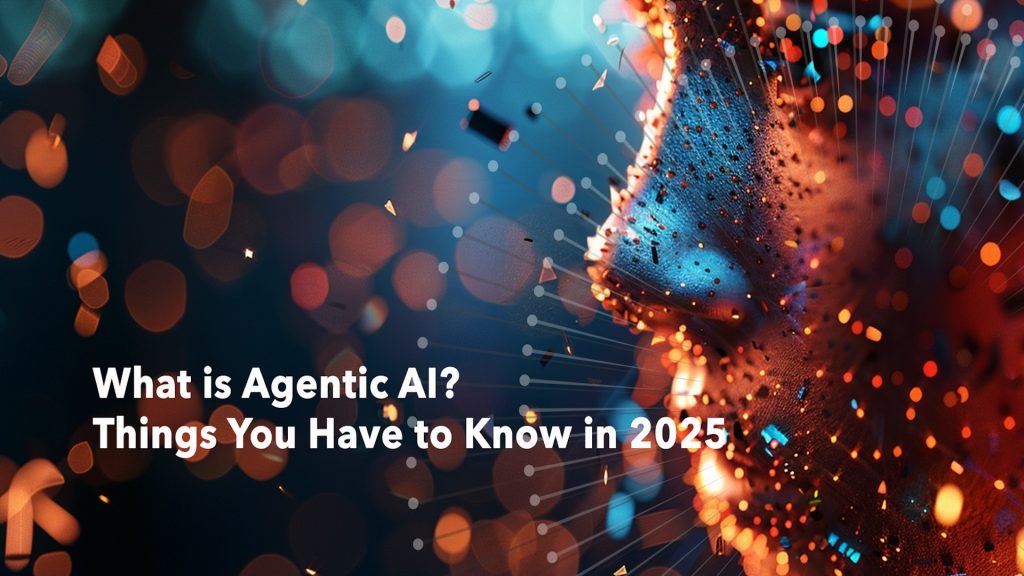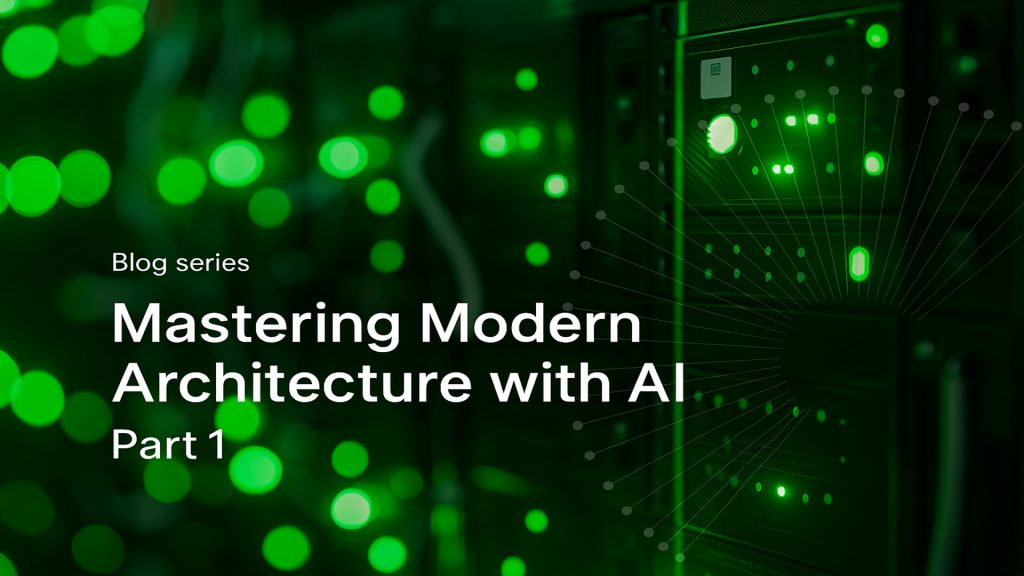What is Agentic AI? Things You Have to Know in 2025
Agentic AI represents the next stage in the evolution of artificial intelligence. These systems autonomously set goals, adapt their strategies, and learn from their environments—minimizing the need for ongoing human oversight. Although this technology might seem futuristic, it is rapidly becoming integral to a variety of sectors.
Below is a simplified guide to Agentic AI, along with 12 crucial insights that will help you understand its transformative potential in 2025.
Key Takeaways
Before diving deeper into Agentic AI, here’s a concise overview of the topics and insights covered in this article:
• Agentic AI systems act independently, setting goals and adapting in real-time.
• It differs from traditional AI by focusing on autonomy and continuous learning.
• Key applications include healthcare, logistics, IoT, and autonomous vehicles.
• Ethical and governance challenges will dominate its 2025 trajectory.
• Emerging trends include edge computing integration, smarter autonomous systems, and generative AI collaborations.
Understanding Agentic AI
Agentic AI is adding to the landscape of artificial intelligence by merging autonomy with adaptability. Below, we’ll explore its core definition, explain how it differs from traditional AI, and discuss why this technology is so pivotal for transformation of your business.
What is Agentic AI
Agentic AI refers to goal-driven software entities capable of completing tasks and reaching objectives without continuous human inputs. The defining feature is their ability to produce outcomes that aren’t fully predetermined—meaning they can act on new information, make unanticipated choices, and evolve to address emerging issues. These agents can learn and improve over time, which positions them to tackle challenges more dynamically than previous AI generations.
For example, in supply chain optimization, an Agentic AI system could autonomously analyze market trends, inventory levels, and logistics data to make real-time decisions on procurement and distribution, adapting to unforeseen disruptions without human oversight.
How It Differs from Traditional AI
Agentic AI goes beyond static models by integrating advanced frameworks that mirror elements of human-like decision-making. While traditional AI typically operates under constraints—responding only when given specific data or prompts—agentic AI actively explores problems, sets its own goals, and refines its strategies through trial, error, and learning. This ability to initiate actions and iterate on solutions makes it particularly suited for multifaceted tasks spanning multiple domains.
Why It Matters
Agentic AI holds potential to streamline business operations, reduce costs, and spark new forms of innovation. By 2028, Gartner predicts that 33% of enterprise software applications will incorporate agentic AI features, growing from less than 1% in 2024. This expansion will empower organizations to rely on AI-driven insights for an estimated 15% of everyday decisions, ultimately reshaping the nature of work.
Key Takeaways:
• Agentic AI offers unparalleled adaptability and scalability.
• Its autonomy in decision-making and problem-solving sets it apart from traditional systems.
• The technology is poised to transform enterprise operations and decision-making processes.
How Agentic AI Works
Understanding the inner workings of Agentic AI involves examining the core algorithms, structures, and self-optimization techniques that allow it to adapt to changing environments. Below is a deeper look at these essential mechanisms.
Core Components
Agentic AI systems generally follow a four-step framework for tackling challenges:
1. Perceive: They gather and analyze data from diverse sources, extracting relevant features and identifying key variables in the environment.
2. Reason: A large language model often serves as the central orchestrator, interpreting tasks and coordinating specialized sub-models that tackle discrete issues.
3. Act: These systems connect with external tools and software—usually via APIs—to carry out tasks based on an internal plan, with guardrails to ensure accuracy.
4. Learn: Through a continuous feedback loop, they self-correct and refine their approaches, thereby boosting performance and consistency over time.
Autonomous Problem-Solving
One benefit of Agentic AI lies in its proficiency with multi-step challenges. Consider the scenario of supply chain disruptions: an AI agent might forecast demand fluctuations, look into alternative suppliers, shift inventory management approaches, and recalibrate logistics operations—all without human involvement. This hands-off approach allows organizations to adapt to market complexities swiftly.
Role of Generative AI and ML
Generative AI and machine learning amplify the effectiveness of Agentic AI by enhancing creativity and continuous improvement. Generative AI could, for instance, generate new business strategies or content, while machine learning models refine how an agent responds to feedback, improving decision-making accuracy over time.
Key Takeaways:
• Goal-setting algorithms drive adaptability.
• Generative AI elevates problem-solving power.
Applications of Agentic AI
Agentic AI is fueling breakthroughs in numerous fields—from reshaping supply chains to revolutionizing healthcare solutions and powering autonomous technologies. Below are some examples of how it’s making impact across industries. Agentic AI is redefining operational workflows. Beyond automating routine tasks, these AI systems can handle multifaceted responsibilities, sometimes even displacing or redefining traditional hierarchical roles. By delegating key decisions to intelligent agents, businesses can react faster to market changes and experiment with innovative strategies.
Healthcare Innovation
In healthcare, agentic AI promises more accurate diagnostics, personalized treatment plans, and predictive patient care. By synthesizing patient data with cutting-edge medical research, these AI agents can recommend timely interventions or detect potential health threats, improving both patient outcomes and operational efficiency.
IoT and Autonomous Devices
Agentic AI is set to make IoT ecosystems smarter and more proactive. In a smart home, for instance, an AI agent could automatically sense changes in usage patterns to optimize energy consumption. It could also adjust security settings based on unusual activities, operating entirely on its own learned understanding of user behavior and environmental conditions.
Autonomous Vehicles
The automotive industry is increasingly dependent on agentic AI to refine autonomous driving technologies. By analyzing vast real-time data streams—from cameras, sensors, and GPS—these agents make rapid decisions to maintain safety, refine route planning, and continuously adapt to driving conditions.
Key Takeaways:
• Agentic AI transforms industries by increasing efficiency.
• Its applications span business automation to healthcare solutions.
12 Things You Need to Know About Agentic AI in 2025
As we have moved into 2025, staying informed about these developments in Agentic AI becomes critical. Here are 12 key trends and insights that will shape its future:
1. Self-Optimizing Systems:
- Becoming more adaptive through self-correcting capabilities.
2. Integration with Edge Computing:
- Enhancing real-time decision-making for edge devices.
3. Ethical Frameworks:
- Addressing global standards for responsible use.
4. Smarter IoT Devices:
- Enabling seamless automation through intelligent devices.
5. Governance Challenges:
- Establishing frameworks for regulating autonomous systems.
6. Generative Collaborations:
- Partnerships enhancing creativity through generative capabilities.
7. Scalability:
- Facilitating efficient scaling of business operations.
8. Industry Innovations:
- Breakthroughs tailored for sectors like logistics and healthcare.
9. AI-Driven Decision-Making:
- Enhancing predictive analytics for dynamic problem-solving.
10. Sustainability Role:
- Supporting green energy initiatives through optimization efforts.
11. Public Perception:
- Societal acceptance influencing widespread use.
12. AI as a Service (AIaaS):
- Growing trend towards accessible platforms for businesses.
Conclusion
Agentic AI means a leap forward in artificial intelligence, introducing a level of autonomy that can change how we tackle complex issues across multiple domains. By integrating autonomous decision-making with real-time learning, it not only streamlines operations but also opens doors to new possibilities—reshaping everything from supply chains to healthcare delivery.
Get started with Turbotic
How do you know if Agentic AI is for you and your organization? To exploit the power of automation and AI in your enterprise, consider beginning your journey with Turbotic. Our AI assistant provides support aimed at driving operational efficiency while allowing you to integrate advanced AI capabilities at your own pace.
Get started for free!FAQs About Agentic AI
Still have questions about Agentic AI? This section answers the most frequently asked questions to clarify its concepts, benefits, and challenges.
What is Agentic AI?
Agentic AI refers to autonomous systems capable of setting their own goals, making decisions, and adapting to new environments—all without requiring continuous human guidance.
How is Agentic AI Different from Traditional AI?
Unlike traditional AI, which relies on predefined rules and inputs, Agentic AI can operate independently by learning from data, making adjustments, and innovating new solutions autonomously.
What Are the Benefits of Agentic AI?
- Increased efficiency: Reduces manual intervention in complex processes.
- Scalability: Easily adapts to large-scale systems and workloads.
- Enhanced decision-making: Uses real-time data for accurate predictions and optimal outcomes.
What Are the Challenges of Implementing Agentic AI?
- Ethical concerns: Balancing autonomy with responsibility.
- Governance: Establishing clear oversight and control mechanisms.
- Data security: Safeguarding sensitive information in autonomous systems.
Which Industries Can Benefit the Most from Agentic AI?
Industries like healthcare, logistics, retail, and finance can leverage Agentic AI for personalized services, predictive analytics, and process automation.
How Will Agentic AI Evolve in 2025?
Agentic AI will see advancements in ethical frameworks, integration with IoT devices, and wider adoption in autonomous applications like smart cities and autonomous vehicles.








